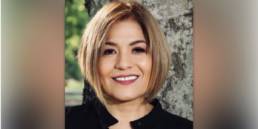Dear HAWC friends,
I hope you’ll join me and everyone at the Houston Area Women’s Center (HAWC) as we celebrate National Hispanic Heritage Month, when we honor the history, culture, and achievements of Hispanics in our nation.
I came to Houston from the beautiful borderland community of El Paso, Texas in 1992 for my first job as a bilingual counselor at HAWC. As a young Latina, Indigenous woman, I was excited to learn more about the city’s Hispanic population. I found and fell in love with a community, diverse in cultural backgrounds and history. I found a people with a shared heritage who also recognized the complexity of identity. I am grateful to the community for nurturing my two daughters, Gina and Veronica, who now use their voices as Native American and Latina feminists. I feel privileged that our story is now a part of the Houston Hispanic community’s story of survival, resilience, and triumph.
For thirty years, I have worked to end domestic and sexual abuse and have had the opportunity to serve on numerous local, state and national boards, committees, and task forces. As the Deputy CEO, I now have the pleasure of working alongside great leaders and community partners and have the great privilege of leading a staff dedicated to our clients’ safety and self-determination.
October is Domestic Violence Awareness Month and is a great opportunity to highlight the important work HAWC does to support Hispanic survivors in our community.
Domestic violence impacts everyone and crosses all socioeconomic, religious, and cultural lines. It is a public health crisis that disproportionately impacts women and women of color from communities harmed by historical and ongoing oppression.
Hispanic survivors often do not seek help and face barriers when they attempt to flee. Immigrant survivors may often experience severe abuse when they arrive and are exceedingly vulnerable due to fear of deportation and language limitations.
As I reflect upon my 30-year career at HAWC, I see how my own growth and evolution has mirrored that of the organization. HAWC started education programs specifically targeting the Hispanic community in 1991 – and advocacy efforts on their behalf were integrated into our work. As our city’s Hispanic population has grown and further diversified, so too has HAWC’s client base.
Today, HAWC’s client base is 50% Hispanic. In response, our staff is 44% percent bilingual and bicultural.
I am proud that HAWC has a herstory of creating meaningful connections to diverse Hispanic groups. We seek to understand each survivor’s unique cultural challenges as they relate to domestic and sexual violence. We know that we must continue to center the voices of the community in the development, implementation, and evaluation of all our programs. We must be proactive and responsive to the structural inequities Latina survivors experience and acknowledge that the intersection of race and gender bias leads to increased victimization.
We can’t do it alone. It is only through enhanced authentic collaboration that we identify, respond, and prevent domestic and sexual violence. We are grateful for our many community partners who recognize that these crimes impact families, neighbors, and entire communities. Together, we are collaborating on solving the problem by being effective changemakers in every population we serve.
Gracias for your vital and ongoing apoyo during this very special month,
Sonia Corrales
Deputy CEO
Houston Area Women’s Center

